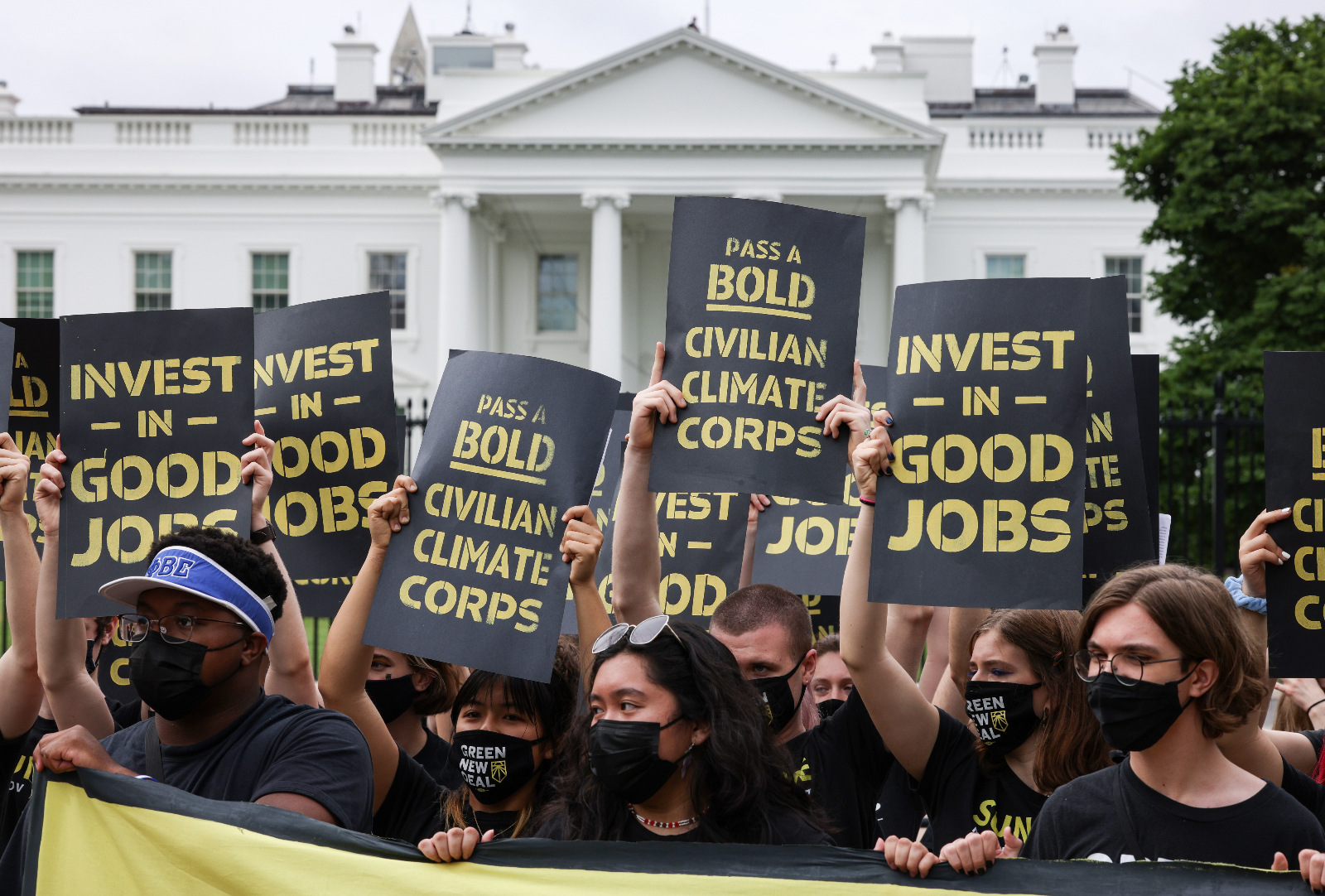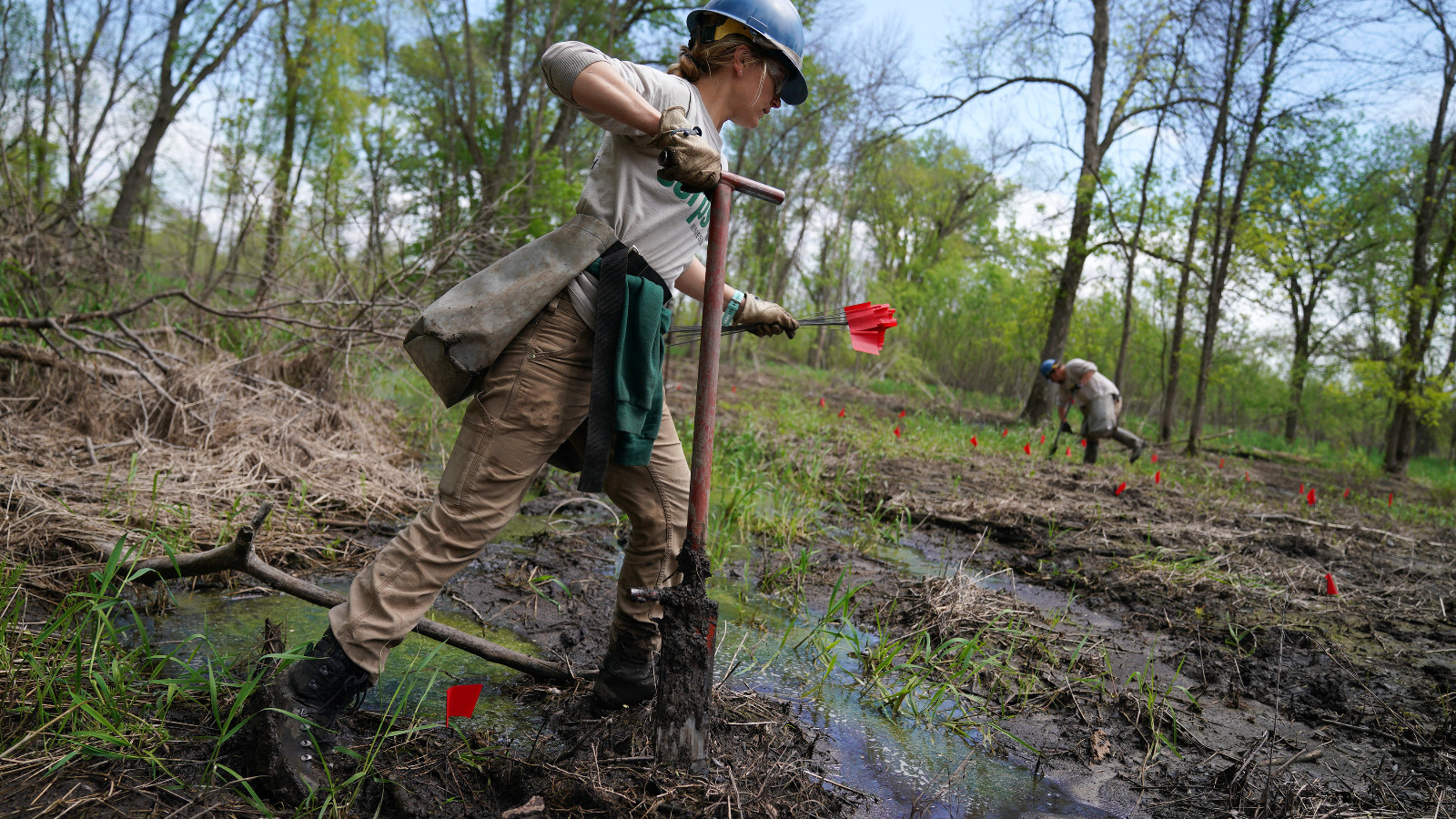In the depths of the Great Depression in 1933, President Franklin D. Roosevelt warned Congress that millions of Americans were idly “walking the streets,” presenting a threat to the country’s stability, even though they “would infinitely prefer to work.” It’s part of the reason he proposed the Civilian Conservation Corps, a program that would hire men to preserve forests, prevent soil erosion, and control floods. “More important, however, than the material gains will be the moral and spiritual value of such work,” Roosevelt said.
President Joe Biden referenced that line last month when he announced the launch of the American Climate Corps, a government jobs program inspired by Roosevelt’s that tackles the environmental problems of the 21st century. Besides the obvious benefits of restoring wetlands and installing solar panels, the climate corps is intended to pave a path to green careers for those who sign up. Another advantage of joining, though less-discussed, is that it could help alleviate widespread climate anxiety, channeling young people’s concern into concrete, hands-on work. More than half of Americans are anxious, to some degree, about how climate change is affecting their mental health. There are only about 250 job listings on the climate corps site right now, though some of those openings have multiple positions. The White House expects to employ 20,000 people over the program’s first year.
While the vast majority of 18- to 28-year-olds in the United States say they’re worried about climate change, two-thirds of them are unsure what they can do to make a difference, according to polling from the think tank Data for Progress in 2022. The combination is ripe for “climate anxiety,” a catch-all term for the feelings of grief, fear, and distress that’s not so much a clinical diagnosis as a logical response to living through the hottest period on Earth in 125,000 years.
According to common wisdom, the best way to treat existential dread about global warming is to “take action.” But not all types of climate action are equal. Proponents of the American Climate Corps suggest that the program offers something more substantial than ditching meat or taking a bike ride — it’s a chance to work on climate change or environmental justice issues all day as part of a larger cause. “There’s something about, ‘Here is a clear job with a clear timeline and a clear local goal. I can, like, put my hands in the dirt,’” said Kidus Girma, campaign director of the Sunrise Movement, a youth-led climate organization that fought to make the climate corps happen.
In small doses, anxiety can prompt people to do something, but in large doses, it can be incapacitating. The structure of the American Climate Corps could be useful for young people who are overwhelmed by the enormity of a global problem and aren’t sure where to start, said McKenna Parnes, a clinical psychology researcher at the University of Washington.
Taking action as part of a group, as opposed to going it alone, can significantly alleviate the distress associated with climate change, according to a study Parnes co-authored in 2022. Climate corps members wouldn’t necessarily need to be working with people all day to get those benefits. “Even if it’s folks that are doing individual jobs but part of the greater collective, just by nature of being part of the climate corps, there’s already that collective piece,” she said.

Kevin Dietsch / Getty Images
Jennifer Rasmussen, a registered nurse and an education fellow with the Planetary Health Alliance, a global network of organizations addressing the health effects of environmental changes, said that social support networks are key for improving mental health, especially with the rise of loneliness among young people. Being a member of the corps could also provide a sense of purpose and fulfillment, as well as help people build self-confidence by learning new skills — all of which tend to increase people’s psychological resilience and well-being, she said.
Roosevelt might have been ahead of his time when he wished the initial Civilian Conservation Corps members a “pleasant, wholesome, and constructively helpful stay in the woods.” Recent research suggests that feeling a connection to nature is associated with lower levels of depression and anxiety, another promising sign for American Climate Corps members who end up tending to forests, streams, or community gardens.
Climate anxiety comes in different forms: It can spring from a disaster, such as living through a flood, hurricane, or smoke-filled wildfire season. It can also take the shape of some existential dread about the future, even if you haven’t experienced a disaster yourself. A survey in 2021 found that climate anxiety was common in 10 countries across four continents, with 45 percent of young people saying that worrying about the environment was affecting their daily lives and ability to function.
That report suggested that this emotional distress stemmed from governments’ failure to respond to the problem. That rings true for Matt Ellis-Ramirez, a coordinator at Sunrise Movement Miami who recently graduated from the University of Miami and is thinking about joining the American Climate Corps. In Florida, for instance, a bill that removes most mentions of climate change from the state’s laws was signed by Governor Ron DeSantis on Wednesday, and last month, DeSantis signed legislation that bans local rules to protect outdoor workers from extreme heat.
“I think that’s where my anxiety comes from — that if we’re not actually able to shift our political system, that we might actually just be watching Miami become unlivable,” Ellis-Ramirez said.
Ellis-Ramirez is most excited about applying for hands-on positions in the American Climate Corps, like restoration efforts in the Everglades or planting trees in neighborhoods that lack them. Girma said that if he was looking for a job in the corps, he’d like to work on coastal restoration. “But I don’t think I would confidently say coastal restoration is the thing for people who have anxiety,” he said. “I think it’s broadly like, ‘Can I see a clear, measurable impact from my work day to day?’”
Saul Levin, the legislative and political director at the Green New Deal Network, says that there’s something empowering about knowing that people are working around you to address climate change and make communities safer. “It’s really not just the thousands and thousands of people who will be employed through the [American Climate Corps] who I think could have had their mental health improved, but also their acquaintances, families, neighbors, who similarly will benefit from knowing that folks are actually being hired to work on this.”
This story has been updated to reflect Governor DeSantis’ signing of a bill and the number of job openings available.

